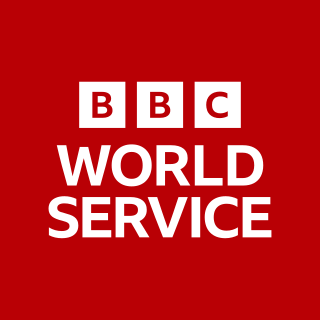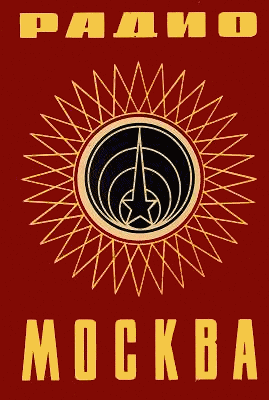
The BBC World Service is an international broadcaster owned and operated by the BBC. It is the world's largest external broadcaster in terms of reception area, language selection and audience reach. It broadcasts radio news, speech and discussions in more than 40 languages to many parts of the world on analogue and digital shortwave platforms, internet streaming, podcasting, satellite, DAB, FM and MW relays. In 2015, the World Service reached an average of 210 million people a week. In November 2016, the BBC announced that it would start broadcasting in additional languages including Amharic and Igbo, in its biggest expansion since the 1940s.

Shortwave radio is radio transmission using radio frequencies in the shortwave bands (SW). There is no official definition of the band range, but it always includes all of the high frequency band (HF), which extends from 3 to 30 MHz ; above the medium frequency band (MF), to the bottom of the VHF band.
International broadcasting, in a limited extent, began during World War I, when German and British stations broadcast press communiqués using Morse code. With the severing of Germany's undersea cables, the wireless telegraph station in Nauen was the country's sole means of long-distance communication.

Yleisradio Oy, abbreviated as Yle, translated into English as the Finnish Broadcasting Company, is Finland's national public broadcasting company, founded in 1926. It is a joint-stock company, which is 99.98% owned by the Finnish state and employs around 3,200 people in Finland. Yle shares many of its organisational characteristics with its British counterpart, the BBC, on which it was largely modelled.
Radio Canada International (RCI) is the international broadcasting service of the Canadian Broadcasting Corporation (CBC). Prior to 1970, RCI was known as the CBC International Service. The broadcasting service was also previously referred to as the Voice of Canada, broadcasting on shortwave from powerful transmitters in Sackville, New Brunswick. "In its heyday", said Radio World magazine, "Radio Canada International was one of the world's most listened-to international shortwave broadcasters". However, as the result of an 80 percent budget cut, shortwave services were terminated in June 2012, and RCI became accessible exclusively via the Internet. It also reduced its services to five languages and ended production of its own news service.

Radio Netherlands was a public radio and television network based in Hilversum, producing and transmitting programmes for international audiences outside the Netherlands from 1947 to 2012.
Sveriges Radio AB is Sweden's national publicly funded radio broadcaster. Sveriges Radio is a public limited company, owned by an independent foundation, previously funded through a licensing fee, the level of which is decided by the Swedish Riksdag. As of 1 January 2019, the funds stem from standard taxation. No advertising is permitted. Its legal status could be described as that of a quasi-autonomous non-governmental organization.

Radio Havana Cuba is the official government-run international broadcasting station of Cuba. It can be heard in many parts of the world, including the United States, on shortwave frequencies. Radio Havana Cuba, along with Radio Rebelde, Cubavision Television, and other Cuban radio and television, broadcasts to North, Central and South America via free-to-air programming from the Hispasat 30W-6 satellite over the Atlantic Ocean and worldwide via Internet streaming.

Radio Moscow, also known as Radio Moscow World Service, was the official international broadcasting station of the Union of Soviet Socialist Republics until 1993, when it was reorganized into Voice of Russia, which was subsequently reorganized and renamed into Radio Sputnik in 2014. At its peak, Radio Moscow broadcast in over 70 languages using transmitters in the Soviet Union, Eastern Europe, and Cuba.

Shortwave listening, or SWLing, is the hobby of listening to shortwave radio broadcasts located on frequencies between 1700 kHz and 30 MHz (30 000 kHz). Listeners range from casual users seeking international news and entertainment programming, to hobbyists immersed in the technical aspects of long-distance radio reception and sending and collecting official confirmations that document their reception of remote broadcasts (DXing). In some developing countries, shortwave listening enables remote communities to obtain regional programming traditionally provided by local medium wave AM broadcasters. In 2002, the number of households that were capable of shortwave listening was estimated to be in the hundreds of millions.
Vatican Radio is the official broadcasting service of Vatican City.
HCJB, "The Voice of the Andes", was the first radio station with daily programming in Ecuador and the first Christian missionary radio station in the world. The station was founded in 1931 by Clarence W. Jones, Reuben Larson, and D. Stuart Clark. HCJB now focuses on Ecuador with unified programming on FM at 89.3 MHz in Pichincha, at 92.5 MHz in Manabí, at 96.1 MHz in Tungurahua and Cotopaxi, at 98.3 MHz in Esmeraldas and with separate programming on AM at 690 kHz. Broadcasts in Spanish and indigenous languages on 6.05 MHz (1 kW), continue on an intermittent basis with a new solid state transmitter which in 2017 replaced an older (5 kW) transmitter. These broadcasts were not listed on the HCJB English website as of February 2016.

Radio Poland is the official international broadcasting station of Poland and is a part of Poland’s public radio network, Polish Radio.
Radio Prague International is the official international broadcasting station of the Czech Republic. Broadcasting first began on August 31, 1936 near the spa town of Poděbrady. Radio Prague broadcasts in six languages: English, German, French, Spanish, Czech and Russian. It broadcasts programmes about the Czech Republic on satellite and on the Internet.
Channel Africa is the international broadcasting service of the South African Broadcasting Corporation.
The International Radio of Serbia, formerly Radio Yugoslavia was the official international broadcasting station of Serbia.
United Nations Radio was created on 13 February 1946. In 2017, United Nations Radio and the UN News Centre merged to form UN News, producing daily news and multimedia content in Arabic, Chinese, English, French, Swahili, Portuguese, Russian, Spanish, and Hindi. In its new iteration, UN News Audio continues to produce daily news and feature stories about the work of the UN and its member countries in eight languages for more than 2,000 partner radio stations around the world.
Arne Skoog was born in 1913 in the northern Swedish province of Jämtland. He died on 7 June 1999 aged 86.
Sweden Calling DXers was a radio program on Radio Sweden, founded in 1948 by Arne Skoog. He reasoned that shortwave listening or DXing was a very young hobby, and that by providing information in a weekly program for shortwave listeners about their hobby, Radio Sweden was teaching its own audience about how to listen better. While the first program was based solely on Arne's own listening, listeners were encouraged to write in with their own news, and soon virtually all of the program was based on listener's letters.
George MacClaren Wood III is an American journalist who has worked at Radio Sweden since 1975, He was born in Berkeley, California on August 10, 1949, and grew up in Piedmont, California. He has degrees from the University of California, Santa Barbara and the University of California, Berkeley, and participated in the university's Education Abroad Program to Lund University in Sweden, 1969-1970.







